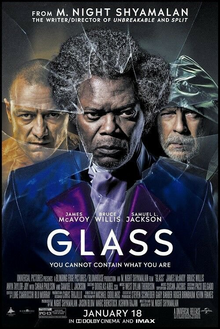
Plot Summary: Set after the events of "Unbreakable" and "Split," "Glass" follows the intertwined fates of David Dunn, a vigilante known as The Overseer with superhuman strength and intuition; Kevin Wendell Crumb, a man with multiple personalities, including one called The Beast; and Elijah Price, also known as Mr. Glass, a brilliant but fragile mastermind. Captured and placed in a psychiatric facility under the care of Dr. Ellie Staple, the three individuals must confront their beliefs about their own abilities and the existence of superhumans. As tensions rise and secrets are revealed, a thrilling showdown ensues with far-reaching consequences.
Cast: The film features a stellar cast, with Bruce Willis reprising his role as David Dunn / The Overseer, Samuel L. Jackson as Elijah Price / Mr. Glass, and James McAvoy as Kevin Wendell Crumb / The Horde. Sarah Paulson delivers a standout performance as Dr. Ellie Staple, a psychiatrist tasked with debunking the superhuman claims of the protagonists. With compelling portrayals and complex character dynamics, the cast brings depth and authenticity to the story.
Production: Directed by M. Night Shyamalan, "Glass" seamlessly integrates elements from both "Unbreakable" and "Split" to create a cohesive narrative that explores the consequences of superhuman abilities in a realistic setting. Filmed in Philadelphia and utilizing deleted footage from "Unbreakable," the movie maintains a gritty and atmospheric tone throughout. Composer West Dylan Thordson's score, incorporating themes from both previous films, adds to the film's emotional impact and sense of continuity.
Reception: "Glass" received mixed reviews from critics, with some praising its ambitious storytelling and compelling performances, while others found fault with its pacing and narrative structure. Despite the divided opinions, the film resonated with audiences worldwide, grossing over $247 million against a modest production budget of $20 million. While it may not have satisfied all expectations, "Glass" remains a thought-provoking conclusion to the Unbreakable trilogy, exploring themes of power, identity, and the blurred line between hero and villain.
Conclusion: "Glass" stands as a bold and ambitious conclusion to M. Night Shyamalan's Unbreakable trilogy, blending elements of superhero mythology with grounded storytelling and complex characters. With its stellar cast, gripping storyline, and atmospheric direction, the film offers audiences a compelling exploration of the human psyche and the nature of power. While opinions may vary on its execution, "Glass" remains a thought-provoking addition to the superhero genre, leaving viewers pondering its themes long after the credits roll.
